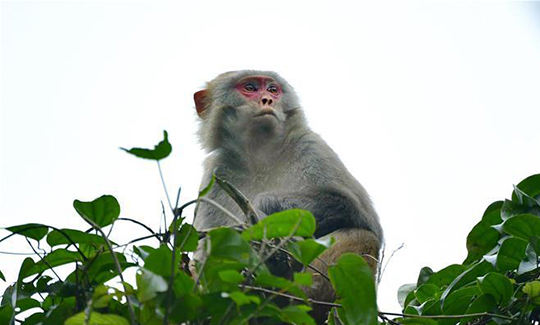


[File photo]
Monkeys have the vocal tracts to produce human speech sounds, but what they lack is a speech-ready brain, a new study has found.
The study, conducted by researchers from the U.S. and Europe and published this week in the U.S. journal Science Advances, used X-ray video to see within the mouth and throat of macaque monkeys induced to vocalize, eat food, or make facial expressions.
The scientists then used these data to build a computer model of a monkey vocal tract, allowing them to answer the question "what would monkey speech sound like, if a human brain were in control?"
The results showed that monkeys could easily produce many different sounds, enough to produce thousands of distinct words.
For example, monkeys could produce comprehensible vowel sounds -- and even full sentences -- with their vocal tracts if they had the neural ability to speak.
The researchers noted, however, that while monkeys would be understandable to the human ear, they would not sound precisely like humans.
Therefore, the researchers concluded that previous research -- largely based on plaster casts made from the vocal tracts of a monkey cadaver -- underestimates primate vocal abilities and that evolution of human speech capabilities required neural changes rather than an adaptation of vocal anatomy.
"Now nobody can say that it's something about the vocal anatomy that keeps monkeys from being able to speak -- it has to be something in the brain," said Asif Ghazanfar, a professor of psychology at the Princeton University and one of the study leaders.
"Even if this finding only applies to macaque monkeys, it would still debunk the idea that it's the anatomy that limits speech in nonhumans."
Thore Jon Bergman, an assistant professor of psychology and ecology and evolutionary biology at the University of Michigan, who is familiar with the research but was not involved in it, said that the research could help narrow down the origin of human speech.
"It looks like mainly neuro-cognitive -- as opposed to anatomical -- differences contribute to the broader range of sounds we produce relative to other primates," Bergman said in a statement released by the Princeton University.
"An important part of understanding human uniqueness is to know what our relatives do," he said. "This study shows that the anatomical capability to make a variety of sounds, as we do with speech, was present long ago. This is useful for understanding the starting point for the evolution of language."
 Fire brigade in Shanghai holds group wedding
Fire brigade in Shanghai holds group wedding Tourists enjoy ice sculptures in Datan Town, north China
Tourists enjoy ice sculptures in Datan Town, north China Sunset scenery of Dayan Pagoda in Xi'an
Sunset scenery of Dayan Pagoda in Xi'an Tourists have fun at scenic spot in Nanlong Town, NW China
Tourists have fun at scenic spot in Nanlong Town, NW China Harbin attracts tourists by making best use of ice in winter
Harbin attracts tourists by making best use of ice in winter In pics: FIS Alpine Ski Women's World Cup Slalom
In pics: FIS Alpine Ski Women's World Cup Slalom Black-necked cranes rest at reservoir in Lhunzhub County, Lhasa
Black-necked cranes rest at reservoir in Lhunzhub County, Lhasa China's FAST telescope will be available to foreign scientists in April
China's FAST telescope will be available to foreign scientists in April "She power" plays indispensable role in poverty alleviation
"She power" plays indispensable role in poverty alleviation Top 10 world news events of People's Daily in 2020
Top 10 world news events of People's Daily in 2020 Top 10 China news events of People's Daily in 2020
Top 10 China news events of People's Daily in 2020 Top 10 media buzzwords of 2020
Top 10 media buzzwords of 2020 Year-ender:10 major tourism stories of 2020
Year-ender:10 major tourism stories of 2020 No interference in Venezuelan issues
No interference in Venezuelan issues
 Biz prepares for trade spat
Biz prepares for trade spat
 Broadcasting Continent
Broadcasting Continent Australia wins Chinese CEOs as US loses
Australia wins Chinese CEOs as US loses